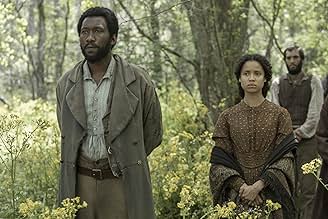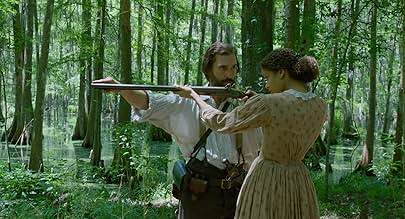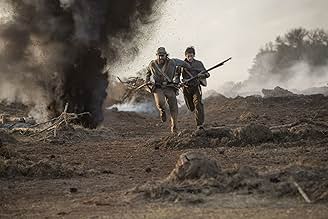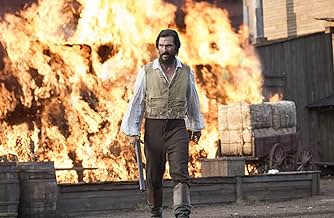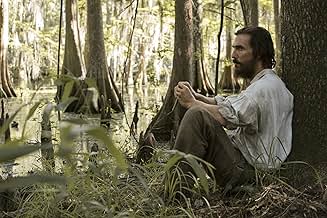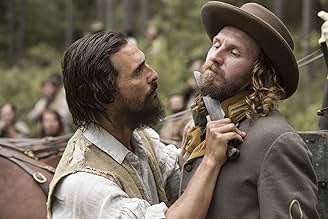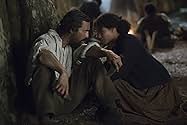Un desilusionado desertor del ejército confederado regresa a Mississippi y lidera una milicia compuesta de otros desertores y mujeres en un levantamiento contra el corrupto gobierno confeder... Leer todoUn desilusionado desertor del ejército confederado regresa a Mississippi y lidera una milicia compuesta de otros desertores y mujeres en un levantamiento contra el corrupto gobierno confederado local.Un desilusionado desertor del ejército confederado regresa a Mississippi y lidera una milicia compuesta de otros desertores y mujeres en un levantamiento contra el corrupto gobierno confederado local.
- Premios
- 3 premios ganados y 4 nominaciones
Jessica Ann Collins
- Annie
- (as Jessica Collins)
Donald Elise Watkins
- Wilson
- (as Donald Watkins)
Argumento
¿Sabías que…?
- TriviaIn 2016 a document was discovered in the National Archives which was a request by Newton Knight's company to join the Union Army in 1864. It lends validity to Knight's claims.
- ErroresWhen the plantation owner comes back home after the war and walks through the front door you can see a thermostat on the wall to his left.
- Citas
Will Sumrall: [referring to Daniel] He died with honor.
Newton Knight: No, Will, he just died.
- ConexionesFeatured in The History of Jones County (2016)
- Bandas sonorasBeautiful Dreamer
Written by Stephen Foster
Opinión destacada
I had read Prof. Bynum's excellent books about the Jones County rebellion and so had been looking forward to the movie. Though it, inevitably, changes the story (you'd need a dozen hours to tell it completely), it remains faithful to the spirit of the rebellion and the characters of Newton and Rachel Knight.
There were a number of Unionist uprisings in the South during the Civil War (a fact that was carefully expunged from my history textbooks, growing up in the South, maybe to justify all the monuments celebrating the glorious Olde South that lurk around public parks and buildings to intimidate black Southerners - I guess). What other purpose could they possibly serve? To celebrate a defeat?
This movie finally points out the obvious: the Confederacy lost the war, but the planter class which owned the Confederacy did their damnedest to win the peace. Instead of being lynched like Mussolini, Confederate leaders returned to their lives, their plantations, just like the war had never happened. Even the slaves they lost were returned to them in the form of unpaid sharecroppers. The misery of the lives of freedmen is one of the strongest images to take away from this film, their alleged freedom snatched from them. No 40 acres and a mule to serve as some form reparation, they went on to endure a century of domestic terrorism at the hand of the KKK.
The movie itself is beautifully and sensitively acted and filmed. There are scenes of great brutality but which are never gratuitous. There are also scenes of great beauty. There are scenes which have enormous relevance to politics in America today where racism is the hallmark of one Presidential candidate and income inequality the hallmark of another.
Claims by the radical left that this movie is about a "white savior" are just silly. If anything, Gary Ross has eliminated most of the real-life incidents which dealt with Newton Knight's own actions on behalf of freedmen, probably to make the film more palatable to the radical left who, like the extreme right-wing can never be satisfied anyway. I do wish the radical left, rather than criticizing well-intentioned liberals like Gary Ross, would attack the real enemy. The State of Mississippi still incorporates the Confederate flag in its state flag... and social justice warriors are quibbling about degrees of "white saviordom"?
Matthew McConaughey hasn't put a foot wrong since Lincoln Lawyer and his performance here is among his best work. American actors are rarely convincing playing period roles but he totally inhabits the role - scraggly beard, greasy hair, terrible teeth and attitude. He looks like the daguerrotype of a tired and desperate Civil War soldier. Gugu Mbatha-Raw has flown too long under the radar: stunningly touching as an early 19th century biracial heiress in Belle and totally believable as a pop star headed for a nervous breakdown in Beyond the Lights, she brings a luminous quality to Rachel a resourceful woman who defined her own path despite the oppression of racist Southern culture.
Mahershala Ali's character won't be found in Prof. Bynum's books. The names of the maroons who fought with the Knight Company have been lost to history, so he is a composite character invented by Gary Ross. His character travels from runaway slave to armed insurgent to voting rights activist in Reconstruction. Ali imbues his character with wit, charm, warmth and extraordinary courage.
Keri Russell is fine in a small role. She gives her heartbroken character dignity and resilience.
Highly recommended.
There were a number of Unionist uprisings in the South during the Civil War (a fact that was carefully expunged from my history textbooks, growing up in the South, maybe to justify all the monuments celebrating the glorious Olde South that lurk around public parks and buildings to intimidate black Southerners - I guess). What other purpose could they possibly serve? To celebrate a defeat?
This movie finally points out the obvious: the Confederacy lost the war, but the planter class which owned the Confederacy did their damnedest to win the peace. Instead of being lynched like Mussolini, Confederate leaders returned to their lives, their plantations, just like the war had never happened. Even the slaves they lost were returned to them in the form of unpaid sharecroppers. The misery of the lives of freedmen is one of the strongest images to take away from this film, their alleged freedom snatched from them. No 40 acres and a mule to serve as some form reparation, they went on to endure a century of domestic terrorism at the hand of the KKK.
The movie itself is beautifully and sensitively acted and filmed. There are scenes of great brutality but which are never gratuitous. There are also scenes of great beauty. There are scenes which have enormous relevance to politics in America today where racism is the hallmark of one Presidential candidate and income inequality the hallmark of another.
Claims by the radical left that this movie is about a "white savior" are just silly. If anything, Gary Ross has eliminated most of the real-life incidents which dealt with Newton Knight's own actions on behalf of freedmen, probably to make the film more palatable to the radical left who, like the extreme right-wing can never be satisfied anyway. I do wish the radical left, rather than criticizing well-intentioned liberals like Gary Ross, would attack the real enemy. The State of Mississippi still incorporates the Confederate flag in its state flag... and social justice warriors are quibbling about degrees of "white saviordom"?
Matthew McConaughey hasn't put a foot wrong since Lincoln Lawyer and his performance here is among his best work. American actors are rarely convincing playing period roles but he totally inhabits the role - scraggly beard, greasy hair, terrible teeth and attitude. He looks like the daguerrotype of a tired and desperate Civil War soldier. Gugu Mbatha-Raw has flown too long under the radar: stunningly touching as an early 19th century biracial heiress in Belle and totally believable as a pop star headed for a nervous breakdown in Beyond the Lights, she brings a luminous quality to Rachel a resourceful woman who defined her own path despite the oppression of racist Southern culture.
Mahershala Ali's character won't be found in Prof. Bynum's books. The names of the maroons who fought with the Knight Company have been lost to history, so he is a composite character invented by Gary Ross. His character travels from runaway slave to armed insurgent to voting rights activist in Reconstruction. Ali imbues his character with wit, charm, warmth and extraordinary courage.
Keri Russell is fine in a small role. She gives her heartbroken character dignity and resilience.
Highly recommended.
- workbumpf
- 24 jun 2016
- Enlace permanente
Selecciones populares
Inicia sesión para calificar y agrega a la lista de videos para obtener recomendaciones personalizadas
- How long is Free State of Jones?Con tecnología de Alexa
Detalles
- Fecha de lanzamiento
- País de origen
- Sitios oficiales
- Idioma
- También se conoce como
- Free State of Jones
- Locaciones de filmación
- Productoras
- Ver más créditos de la compañía en IMDbPro
Taquilla
- Presupuesto
- USD 50,000,000 (estimado)
- Total en EE. UU. y Canadá
- USD 20,810,036
- Fin de semana de estreno en EE. UU. y Canadá
- USD 7,572,206
- 26 jun 2016
- Total a nivel mundial
- USD 25,035,950
- Tiempo de ejecución2 horas 19 minutos
- Color
- Relación de aspecto
- 1.85 : 1
Contribuir a esta página
Sugiere una edición o agrega el contenido que falta

Principales brechas de datos
By what name was Lucha por la libertad (2016) officially released in India in Hindi?
Responda






